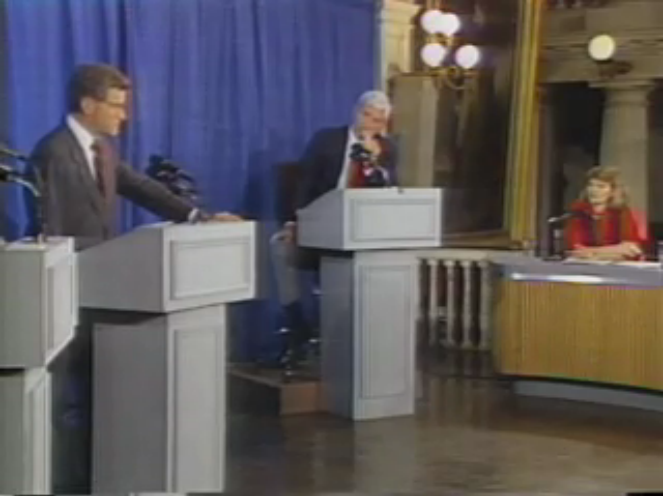Ahead of Thursday evening’s highly-anticipated debate between Vice President Joe Biden and Republican challenger Rep. Paul Ryan, pundits are wondering whether the moderator, ABC News’ Martha Raddatz, will comply with pressure from media colleagues to be more aggressive than Jim Lehrer of PBS was in last week’s presidential debate.
There is reason to believe she might: Raddatz has irked at least one campaign from the moderator’s seat: the 1990 gubernatorial campaign of Democrat John Silber, president of Boston University.
Raddatz (at right, above) famously asked Silber why he had not campaigned more frequently in poor minority communities, prompting him to respond: “There is no point in my making a speech on crime control to a group of drug addicts.”
Silber, amidst accusations of racism, fought to clarify his remarks in the days that followed, and visited the predominantly black community of Roxbury in Boston–though he refused to apologize. He went on to win the Democratic primary by 10 points, though he lost to Republican William Weld in the general election.
While Silber was responsible for his own gaffe, public consensus was that Raddatz had likely aimed to knock him off balance, joining the media’s general skepticism of–and opposition to–his campaign.
In the days that followed, Raddatz–then known as Martha Bradlee, after her first marriage to fellow reporter Ben Bradlee, Jr.–came under intense criticism from the League of Women Voters for what they called “irrelevant,” personal questions.
“During the debate, candidates Francis X. Bellotti and John R. Silber were asked, among other things, what they do when they see a homeless person, asked to describe their personal driving records, to comment on their prior knowledge of Kitty Dukakis’ problems with drugs and alcohol and to itemize the value of their real estate holdings,” reported Renee Loth of the Boston Globe at the time [1].
The League of Women Voters complained that Raddatz’s questions produced “no insight into the programs or policies of the candidates.”
A Democratic consultant agreed: “I don’t mind saying on the record that this was a crop of absolutely ridiculous, frivolous questions that were designed to call attention to the questioner,” i.e. to Raddatz.
Silber’s eventual triumph in the primary came despite strong opposition from the mainstream media, which had predicted he would lose. The media had been so active in their disdain for the politically-incorrect Silber that they became, in effect, part of the campaign, sparking a backlash from the public and from Silber himself.
In examining the media’s role, the Boston Globe recounted a Silber quip from the campaign trail:
“What the media have not adequately assessed,” he said, “is that if power tends to corrupt politicians and businessmen and lawyers, there’s a good reason to believe it tends to corrupt journalists as well.” [2]
For her part, Bradlee was adamant that journalists had to stand up to accusations of bias:
“The media has to be careful,” she said. “The danger is that, because [Silber] attacks, the media may lay back and not cover him as vigorously as other candidates.”
Silber’s eventual loss to Weld was widely attributed to another “intemperate” response to a personal question in a debate [3]–coming from one of Raddatz’s colleagues at Boston’s WCVB-TV (Channel 5), Natalie Jacobson.
[1] Renee Loth, “League of Women Voters slams debate questions as ‘irrelevant’,” Boston Globe, Oct. 3, 1990
[2] Charles A. Radin, “Debate emerges within the media; over the way Silber was covered,” Boston Globe, Oct. 3, 1990
[3] Mark Jurkowitz, “Politics as usual? Not on Boston TV: The once-renowned watchdog of the State House and City Hall has lost its bite,” Boston Globe, Sep. 18, 1996.

COMMENTS
Please let us know if you're having issues with commenting.